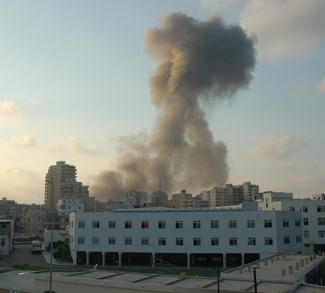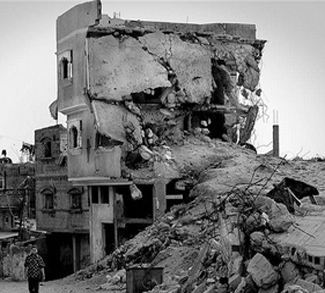Summary
As an increasing number of Israelis and Palestinians shift towards more militant means of achieving their respective political goals against a backdrop of coalescing hawkish groups, failed peace initiatives, and rising anti-Israeli sentiment, expect a continued growth in Mid-East violence centered on Israel.
Analysis
As Israeli troops return home to a nation celebrating victory in the Gaza offensive, the reality is that the end result of the war on Gaza is a strategic loss for Israel.
First and foremost, the litany of alleged war crimes and crimes against humanity Israel is accused of, including use of chemical weapons against innocent civilians and the UN headquarters, targeting of civilians and civilian homes and infrastructure, and targeting of press and medical personnel, has lost Israel all moral and legal prerogative.
The Palestinian death toll of approximately 1400 and 5500 injured, of which a third of both figures are innocent children, was exacerbated by the inability of Palestinians to escape and hide from the disproportionate Israeli onslaught in the Israeli-blockaded Gaza trip. The result has been a palatable shift in world opinion in favour of the Palestinians, with the notable exception of the U.S. and Canada, although anti-Israeli sentiment has risen in both states as a result.
Geopolitically, Israel’s aggression has been a debacle. A number of Arab states have joined Iran, one of Hamas’ primary backers, in severing diplomatic and economic ties with Israel. Syria has suspended its peace talks with Israel, and Turkey, Israel’s strongest ally in the region, has not only pronounced the much-heralded Saudi comprehensive regional peace plan ‘dead’, but is seeking Israel’s ouster from the UN.
In fact, all Arab nations have unequivocally denounced Israel’s actions. No doubt few Arab states, fearing religious based uprisings against their own totalitarian regimes, prefer Hamas, but the recent split in the Arab world (between American allies like Saudi Arabia and foes like Iran) in responding to Israel is even worse for Israel. With the Arabs in open conflict, Israel is increasingly unlikely to enjoy a comprehensive peace with its neighbours. Meanwhile, the Palestinian territories will continue to be the playground of Arab states and foreign covert-ops agencies competing for supremacy.
Strikingly, Saudi Arabia, a staunch U.S. ally, has warned the Obama administration that if it does not act precipitously on the Saudi peace initiative, the proposal will be dead.
So, what did Israel gain?
Not much. Hamas is still in control of Gaza, re-introducing its security forces on the ground the day after the ceasefire and re-opening its damaged offices throughout the territory. So, too, have the tunnels under the Gaza-Egypt border been re-opened, the very tunnels that Israel claimed it intended to destroy. With major pledges of reconstruction and monetary support from Arab states, Hamas’ popularity is spiking not only in Gaza, but also in the West Bank.
The real casualty of the Israeli aggression will be the more moderate Fatah party led by President Mahmoud Abbas. Seen by most Palestinians as having been both complicit in the Israeli offensive in Gaza and utterly ineffectual in halting, or even blunting, the carnage, Abbas will lose all legitimate authority in the Palestinian territories.
Finally, the shocking images of Gazan suffering reverberating around the world is spiking anti-Israeli sentiment in Islamic populations inclined to support armed resistance against expansionist Israeli foreign policy. The danger here, as always, is that support will spill over from local resistance groups to international militant outfits, like al-Qaeda and its offshoots.
Consequently Hamas has emerged a clear winner, along with its backer, Iran. So has Benjamin Netanyahu , the hawkish leader of Israel’s opposition party Likud, whose electoral fortunes are rising as the Israeli electorate, just like the Palestinian electorate, is shifting sharply to the right.
As an increasing number of Israelis and Palestinians shift towards more militant means of achieving their respective political goals against a backdrop of coalescing hawkish groups, failed peace initiatives, and rising anti-Israeli sentiment, the end result will be a continued growth in Mid-East violence centered on Israel.
Thus, Israel may claim to have won the offensive in Gaza, but much like the U.S. learned in Iraq, it is clearly losing the geopolitical war.
Manjit Singh is a contributor to Geopoliticalmonitor.com



